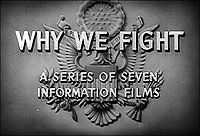Why We Fight: Difference between revisions
No edit summary |
|||
| (One intermediate revision by the same user not shown) | |||
| Line 1: | Line 1: | ||
====Date: [[:Category: | ====Date: [[:Category:1944|1944]]==== | ||
====Region: [[:Category:North America|North America]]==== | |||
====Subject: [[:Category:Political/Economic/Social Opinion|Political/Economic/Social Opinion]]==== | |||
====Medium: [[:Category:Film Video|Film Video]]==== | |||
====Medium: [[:Category:Film Video|Film Video | |||
---- | ---- | ||
[[File:Why_We_Fight.jpg|right|200px]] | |||
'''Artist:''' Frank Capra | '''Artist:''' Frank Capra | ||
'''Confronting Bodies:''' United States army | |||
'''Dates of Action:''' 1944 | |||
''' | '''Location:''' United States | ||
'''Description of Artwork:''' The Battle of China was the last in the series ''Why We Fight'', which were World War II documentary films explaining why US troops were going overseas to fight. The Battle of China oversimplifies the situation in China and did not use actual historic footage. | |||
'''The Incident:''' General George Marshall, who developed the idea for the ''Why We Fight'' series, had told Capra that when he couldn't get a policy statement from the White House or Congress to make his own best guess and to hope that Washington agreed. In the first five movies, which were very popular, Marshall was right. In The Battle of China however, Capra oversimplifies the situation and makes it seem as if China is a united country which it certainly was not. Capra also glorifies China's strategy of retreating from Japan's invasion and buying time however many in China did not think this was a good strategy. Because of these inaccuracies it was recalled. Major General Osbourne wrote to Marshall asking the movie to be recalled. The production of foreign versions of the movie were halted and in 1945 the English version of the movie was withdrawn from circulation. All prints of the movie were then called in. In 1946 a showing of the movie at the Museum of Modern Art was canceled by the army and the film restricted because of its controversial subject matter. | |||
'''Results of Incident:''' The film has since been reinstated and the entire ''Why We Fight'' series has been made available for public viewing. | |||
'''Results of Incident:''' The film has since been reinstated and the entire Why We Fight series has been made available for public viewing. | |||
'''Source:''' Censorship: A World Encyclopedia | '''Source:''' Censorship: A World Encyclopedia | ||
[[Category:1944]] | |||
[[Category:1940s]] | |||
[[Category: | [[Category:20th century]] | ||
[[Category:]] | |||
[[Category:]] | |||
[[Category:North America]] | [[Category:North America]] | ||
[[Category:United States]] | |||
[[Category:]] | |||
[[Category:Political/Economic/Social Opinion]] | [[Category:Political/Economic/Social Opinion]] | ||
[[Category:Film Video]] | [[Category:Film Video]] | ||
[[Category:Frank Capra]] | [[Category:Frank Capra]] | ||
__NOTOC__ | |||
{{DISPLAYTITLE:<span style="font-style: italic;">Why We Fight</span>}} | |||
Latest revision as of 15:41, 29 July 2011
Date: 1944
Region: North America
Subject: Political/Economic/Social Opinion
Medium: Film Video
Artist: Frank Capra
Confronting Bodies: United States army
Dates of Action: 1944
Location: United States
Description of Artwork: The Battle of China was the last in the series Why We Fight, which were World War II documentary films explaining why US troops were going overseas to fight. The Battle of China oversimplifies the situation in China and did not use actual historic footage.
The Incident: General George Marshall, who developed the idea for the Why We Fight series, had told Capra that when he couldn't get a policy statement from the White House or Congress to make his own best guess and to hope that Washington agreed. In the first five movies, which were very popular, Marshall was right. In The Battle of China however, Capra oversimplifies the situation and makes it seem as if China is a united country which it certainly was not. Capra also glorifies China's strategy of retreating from Japan's invasion and buying time however many in China did not think this was a good strategy. Because of these inaccuracies it was recalled. Major General Osbourne wrote to Marshall asking the movie to be recalled. The production of foreign versions of the movie were halted and in 1945 the English version of the movie was withdrawn from circulation. All prints of the movie were then called in. In 1946 a showing of the movie at the Museum of Modern Art was canceled by the army and the film restricted because of its controversial subject matter.
Results of Incident: The film has since been reinstated and the entire Why We Fight series has been made available for public viewing.
Source: Censorship: A World Encyclopedia
